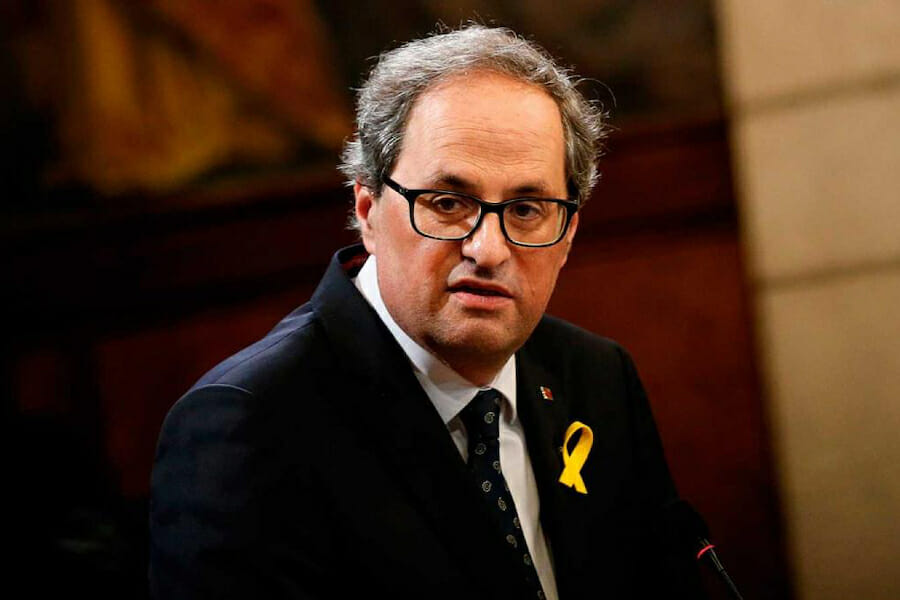
While ETA no Longer Exists, Spain finds ways to Further Criminalize the Pro-sovereignty Movements in Catalonia
Nine members of the Republic Defence Committees (CDR) were arrested on September 23 by the Spanish police in another attempt to intimidate and criminalize the Catalan pro-sovereignty movement on the eve of the sentencing of the 12 political prisoners who will most likely be sentenced to the maximum penalties for exercising their prerogatives of calling for a referendum for the independence of Catalonia, (in October 2017) following the popular will of the Catalan people which provides steps towards achieving a Catalan state.
The operation has been called for by Spain’s National Court (Audiencia Nacional) in Madrid and that means that accusations of “terrorism” are on the table, as otherwise a local Catalan court would have led the operation.
Nine people whose crimes are to defend the right to self-determination of the Catalan people and who have not committed any crime but who are accused of possibly wanting to commit crimes – which reminds us of the popular Hollywood movie, Minority Report.
The Catalan left-wing party, CUP, denounced the action of the Spanish Civil Guard as an attempt to forge evidence and thousands of people took to the streets in several Catalan cities in the afternoon to protest the police actions.
The Catalan pro-sovereignty movement has not committed a single violent act since the Catalan Statute was revoked by the Spanish courts in 2010 which initiated what has been called Procés. However, scenes of violence by the Spanish police during the referendum for independence in October 2017 circulated around the world, along with allegations of political persecution, criminalization of social movements and activists, as well as possible negligence or even collusion with the terrorist attacks in Barcelona in August of 2017.
This is a repetition of the logic used for decades in the Basque Country of “everything is ETA.”
Under this logic, parties have been outlawed, hundreds of people have been tortured, newspapers have been censored and shut down and today Gara newspaper faces the same risk. Evidence of the accusations is an insignificant detail and rarely arise but are not necessary for a judiciary that seems to miss the old Francoist days.
The CDR were founded in the eve of the 2017 Referendum as a network of local assemblies to defend and facilitate the holding of the referendum and subsequently to defend the creation of a Catalan republic through peaceful acts, propaganda and popular mobilizations.
Given the degree of organization of the CDRs, it is not surprising that the police and the Spanish justice system see them as a potential danger to the Spanish control over the region. Henceforth there are continued attempts to criminalize the movement.
To Quim Torra, the president of Catalonia, “repression is the only answer of the Spanish state. They are trying to build a story of violence before the sentences [of the political prisoners]. They will not succeed. The independent movement is and will always be pacific.”
Not surprisingly, the Turkish regime uses Spain as a model for repressing Kurds with impunity. In addition to the events already mentioned, Spain has also initiated another wave of political persecution against Basque activists under the banner of “everything is ETA” – even though the group doesn’t exist anymore.
47 activists from different Basque organizations, as well as lawyers of prisoners that had links to ETA and even journalists and psychologists, were tried this month having been accused of being part of an organization that no longer exists. All defendants have accepted a deal recognising the charges but receiving suspended sentences. Two activists are facing jail for 5 months.
The fact that ETA does not exist does not matter in the Spanish justice system – a fact demonstrated by the case of Altsasu’s youth who were convicted in 2017 – and now it seems Spain’s trying to fabricate a terrorist group, the CDR, as an excuse to further repress and criminalize the pro-sovereignty movement.
Last year the activist Adrià Carracos went into exile and another, Tamara Carrasco, was prevented from leaving her city. Both were accused of terrorism and are members of the CDR. The accusations were then withdrawn.
Soon the sentence of the trial of the Catalan political prisoners will come out, and several activists, politicians, and citizens have pledged to begin a process of peaceful resistance and civil disobedience. Catalan President Quim Torra, as well as several Catalan leaders, have increasingly defended disobedience as a way to deal with Spain – in fact, Torra has repeatedly refused to remove a banner in support of political prisoners from the facade of the Catalan government building as demanded by the Catalan High Court of Justice – and the Spanish government has seen Catalan actions as a threat.
The repression in Catalonia will only increase, as it has done for years in the Basque Country. Francoism, as it seems, remains alive and strong in Spain and is far from being represented only openly by far-right political party VOX (and more veiledly by PP and Ciudadanos), but is an essential part of what is Spain that, for years, has experienced a process of democratic deterioration coupled with a diplomatic behaviour that is not compatible with a modern democracy.
Yet, Europe remains silent in the face of countless demonstrations of abuse and democratic restrictions – including active censorship and persecution of musicians for the lyrics of their songs – calling into question its democratic principles and leaving behind millions of Catalan citizens who, after all, are also European citizens.
